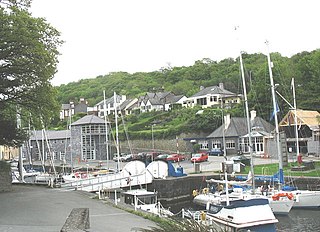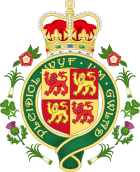This article provides an overview of education in Wales from early childhood to university and adult skills. Largely state-funded and freely accessible at a primary and secondary level, education is compulsory for children in Wales between ages 5-16 years old. It differs to some extent in structure and content to other parts of the United Kingdom, in the later case particularly in relation to the teaching of the Welsh language.
The education system in Northern Ireland differs from elsewhere in the United Kingdom, but is similar to the Republic of Ireland in sharing in the development of the national school system and serving a similar society with a relatively rural population. A child's age on 1 July determines the point of entry into the relevant stage of education in the region, whereas the relevant date in England and Wales is 1 September.

Estyn is the education and training inspectorate for Wales. Its name comes from the Welsh language verb estyn meaning "to reach (out), stretch or extend". Its function is to provide an independent inspection and advice service on quality and standards in education and training provided in Wales.

Abersoch is a village in the community of Llanengan in Gwynedd, Wales. It is a popular coastal seaside resort, with around 2,600 residents, on the east-facing south coast of the Llŷn Peninsula at the southern terminus of the A499. It is about 7 miles (11 km) south-west of Pwllheli and 27 miles (43 km) south-west of the county town of Caernarfon.

Y Felinheli, formerly known in English as Port Dinorwic, is a village and community beside the Menai Strait between Bangor and Caernarfon in Gwynedd, northwest Wales.
Bedwas High School, formerly known as Bedwas Comprehensive School, is a comprehensive school located east of the Welsh village of Bedwas, Caerphilly county borough, south Wales. It has a total enrollment of about 680 pupils ages 11 to 18.
The Welsh Baccalaureate, or Welsh Bacc, is an educational qualification delivered in secondary schools and colleges across Wales. The Welsh Government says that it gives broader experiences than traditional learning programmes, developing transferable skills useful for education and employment. The Welsh Bacc is offered at Advanced, National Foundation and National/Foundation level, and is studied alongside a range of academic and vocational qualifications.
Caldicot School is a coeducational and non-selective secondary school in Caldicot, Monmouthshire, South Wales, with around 1,400 students. In 2013, the school was rated 'Good' by Estyn. At the time of the inspection in November 2013, 11% of pupils were eligible for free school meals against the national average of 17.7%.
Secondary education in Wales covers the period between the ages of 11 and 15 by 31 August. In this period a child's education is divided into two main stages of the National Curriculum: Key Stages 3 and 4.

Coleg Gwent is Wales' largest further education college at various locations in the former county of Gwent, South Wales.

Welsh-medium education is a form of education in Wales in which pupils are taught primarily through the medium of Welsh.
A Welsh Government sponsored body (WGSB) is a non-departmental public body directly funded by the Welsh Government. Under the Government of Wales Act 1998 the bodies were sponsored by the National Assembly for Wales and were known as an Assembly sponsored public body, and this was changed by the Schedule 3 of the Wales Act 2017 which amended the Government of Wales Act 2006.

Ysgol Gymraeg Pwll Coch is a large Welsh-medium primary school in the Canton area of western Cardiff, in Wales.
The National Curriculum was first introduced in Wales as part of the Education Reform Act 1988, alongside the equivalent curriculum for England. Following devolution in 1999, education became a matter for the Welsh Government. Consequently, some elements of the system began to differ from England. This article covers the curriculum as it existed from 2008 until the formal introduction of a new Curriculum for Wales between 2022 and 2026.

Welsh devolution is the transfer of legislative powers for self-governance to Wales by the Parliament of the United Kingdom. The current system of devolution began following the enactment of the Government of Wales Act 1998, with the responsibility of various devolved powers granted to the Welsh Government rather than being the responsibility of the Government of the United Kingdom.
The Curriculum for Wales is the curriculum which is being introduced in state-funded education in Wales for pupils aged three to sixteen years. The curriculum's rollout began in 2022. As of September 2023, it is statutorily required for all pupils apart from those in school years 9, 10 and 11. The curriculum has been developed based on a report commissioned in 2014. Amongst other changes, it gives schools greater autonomy over what they teach children. Views on the curriculum have been varied.
History Grounded or Hanes yn y Tir is a book on the history of Wales by Welsh historian Elin Jones.
Until the latter part of the 20th century, the teaching of Welsh history was predominantly taught from a British or Southern English perspective. In recent decades, there has been a notable increase in emphasis on the teaching of Welsh history, a trend that has persisted into the 21st century.

Medr, also known as the Commission for Tertiary Education and Research, is a tertiary educational and Welsh Government sponsored body, overseeing post-16 education and research in Wales. It was established in August 2024, replacing the Higher Education Funding Council for Wales.
The history of education in Wales from 1939 to the present covers the various types of education available in Wales from the Second World War to the present day. This period has seen an expansion of secondary and higher education, as well as the development of a more distinctive Welsh education system.








